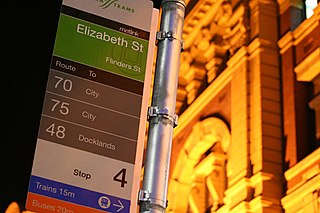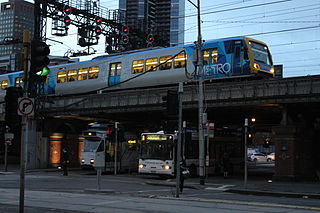Related Research Articles

Metlink was the marketing body and umbrella brand for public train, tram and bus transport operators in Melbourne, Australia. On 2 April 2012, the operations of Metlink were transferred to the newly created public transport planning and management authority, Public Transport Victoria.
The chain of responsibility is a policy concept used in Australian transport legislation to place legal obligations on parties in the transport supply chain or across transport industries generally. The concept was initially developed to apply in the heavy vehicle industry in regulated areas such as speeding, fatigue and mass, loading and dimension. It has since spread to other transport sectors, particularly in Victoria where it has been applied in laws which apply to the rail, bus, marine and taxi industries.

Transport in Melbourne, the state capital of Victoria, Australia, consists of several interlinking modes. Melbourne is a hub for intercity, intracity and regional travel. Road-based transport accounts for most trips across many parts of the city, facilitated by Australia's largest freeway network. Public transport, including the world's largest tram network, trains and buses, also forms a key part of the transport system. Other dominant modes include walking, cycling and commercial-passenger vehicle services such as taxis.
VicRoads is a government joint venture in the state of Victoria, Australia. In the state, it is responsible for driver licensing and vehicle registration. It is owned and operated through a joint venture between the Victorian government and a consortium made up of Aware Super, Australian Retirement Trust and Macquarie Asset Management.

Lynne Janice Kosky was an Australian politician and senior minister in the Government of Victoria. She represented the electoral district of Altona in the Victorian Legislative Assembly for the Labor Party from 1996 to 2010 and held key ministerial posts from 1999 through to her retirement from politics, including the key education and public transport portfolios.
Transport law is the area of law dealing with transport. The laws can apply very broadly at a transport system level or more narrowly to transport things or activities within that system such as vehicles, things and behaviours. Transport law is generally found in two main areas:

The Transport Integration Act 2010 is a law enacted by the Parliament of the State of Victoria, Australia. The Act is the prime transport statute in Victoria, having replaced major parts of the Transport Act 1983, which was renamed as the Transport Act 1983.

The Transport Legislation Review is a policy and legislation review project conducted by the Department of Transport in the State of Victoria, Australia between 2004 and late 2010. The aim of the project was review of transport policy and laws and generation of new policy and legislation as a platform for better transport across the State.

The Department of Transport (DOT) was the government agency responsible for the coordination, integration and regulation of the transport system in the State of Victoria, Australia. The department generated planning, policy, and legislation for transport in Victoria. As a result, the department drove the integration of Victoria's transport land and water transport systems and the delivery of public transport, road and port services and associated activities across the State. The department's stated mission was "Building a safer, fairer and greener transport system for all Victorians to create a more prosperous and connected community."

The Rail Safety Act 2006 is a law enacted by the Parliament of the State of Victoria, Australia, and is the prime statute regulating the safety of rail operations in Victoria. The Act was developed as part of the Transport Legislation Review conducted by the Department of Transport between 2004 and 2010 and is aimed at preventing deaths and injuries arising from rail operations.

The Director of Public Transport was the head of the Public Transport Division (PTD) of the Victorian Department of Transport. PTD was the government agency responsible for promoting, providing, coordinating and regulating public transport in the state of Victoria, Australia between August 1999 and June 2013. The Director of Public Transport was created as a statutory office supported by staff of the Department of Transport.

The Tourist and Heritage Railways Act 2010 is a law enacted by the Parliament of the State of Victoria, Australia and is the prime statute regulating the activities of tourist and heritage rail operators in the State. The Act covers the bulk of Victoria's operational tourist and heritage railways including many heavy and light rail operations and tramways, predominantly in regional areas of Victoria.
The Director, Transport Safety, who operates as Transport Safety Victoria, is the independent Government agency responsible for bus and marine safety in the State of Victoria, Australia. The position was created as a statutory office by the Transport Integration Act 2010 and the office commenced operation on 1 July 2010. The Rail branch of TSV completed transfer to the Office of the National Rail Safety Regulator (ONRSR) in December 2019.
The Chief Investigator, Transport Safety is the independent Government agency responsible for investigation of safety-related trends and incidents in the rail, bus and marine industries in the State of Victoria, Australia.
Public Transport Victoria (PTV) is the brand name for public transport in the Australian state of Victoria. It was previously the trading name of the Public Transport Development Authority (PTDA), a now-defunct statutory authority in Victoria, responsible for providing, coordinating, and promoting public transport.

The Bus Safety Act 2009 is a law enacted by the Parliament of the State of Victoria, Australia and is the prime statute regulating the safety of bus operations in Victoria. The Act was developed as part of the Transport Legislation Review conducted by the Department of Transport between 2004 and 2010 and is aimed at preventing deaths and injuries arising from bus operations in Victoria and establishes a modern "best practice" regulatory framework to assist in maintaining and improving the Victorian bus industry's good safety record.

Commercial Passenger Vehicles Victoria (CPVV), until 2 June 2018 called the Taxi Services Commission (TSC), is the Government agency responsible for the regulation of the taxi and hire car industries in the State of Victoria, Australia. Before becoming a regulator, the TSC was responsible for conducting a major independent inquiry, the Taxi Industry Inquiry, into taxi and other small commercial passenger vehicle services in the State.
The Transport Legislation Amendment Act 2011 is a law enacted by the Parliament of the State of Victoria, Australia to reform taxi and other small commercial passenger vehicle services in the State.
The Transport Act 1983 was the main statute establishing government transport organisations and regulating land transport activities in the State of Victoria, Australia for 27 years from mid-1983 to mid-2010. The act was used as the vehicle for changes to transport organisational arrangements and transport regulation activities pursued by Victorian governments over that period.
The Transport Act 1983 is a prime statute regulating transport activities in the State of Victoria, Australia. Key areas regulated by the statute currently include taxi and hire car services and compliance and enforcement, particularly in areas like safety and public transport ticketing and conduct.
References
- ↑ By operation of the Transport Integration Act, see section 171(2).
- ↑ Review of the Role and Accountability Arrangements for Public Transport and Marine Safety Regulation in Victoria, TFG International Pty Ltd, November 2004.
- ↑ Transport Act 1983.
- ↑ Review of the Role and Accountability Arrangements for Public Transport and Marine Safety Regulation in Victoria, TFG International Pty Ltd, November 2004 - see findings relating to terms of reference 3 for the review, page 5.
- ↑ Review of the Role and Accountability Arrangements for Public Transport and Marine Safety Regulation in Victoria, TFG International Pty Ltd, November 2004 - see findings relating to terms of reference 4 for the review, pages 5-6.
- 1 2 This office was established under the Marine Act 1988.
- ↑ Transport Integration Act 2010, section 171 and related amendments to the Marine Act 1988. See article on the Director, Transport Safety.
- ↑ Second reading of the Bill was moved on 6 October 2005. The Bill was not brought on for debate until February of the following year.
- ↑ Parliament of Victoria, Hansard, Legislative Council, 2 March 2006. For further information about the passage of the bill see the article on the Rail Safety Act.
- ↑ Parliament of Victoria, Hansard, Legislative Council, 28 and 29 March 2006
- ↑ This Act has since been renamed the Transport (Compliance and Miscellaneous) Act 1983.
- ↑ See www.legislation.vic.gov.au, Parliamentary Documents, archive for 2006 Bills of the Victorian Parliament.
- ↑ Under the then Transport Act 1983 (which has since been renamed the Transport (Compliance and Miscellaneous) Act 1983).
- ↑ Detailed background on the creation of the former office of the Director, Public Transport Safety is set out in a separate article on the Rail Safety Act.
- ↑ Hon Lynne Kosky MP, Hansard, Parliament of Victoria, Legislative Assembly, 10 December 2009.
- ↑ For more background, see the companion Wikipedia article on the Rail Safety Act 2006.